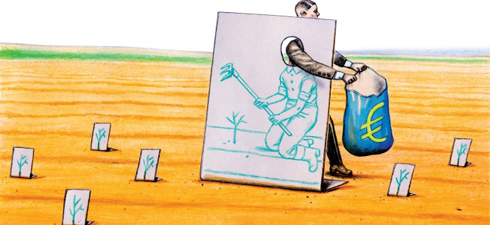Back in 2004, when there were no state subsidies, there were only 3,700 organic farms in Poland. The handful of pioneers who launched the sector were motivated by ideological convictions and the desire to produce healthier food. But making money out of organic farming was actually rather difficult. Now seven years down the line, Poland has more than 21,000 organic farms, covering an area of 519,000 hectares.
The scale of the increase should be a warning to the managers of the EU’s Common Agricultural Policy (CAP): it all seems too good to be true. Over the last six years, a period in which subsidies have been made available for all kinds of agricultural products, the average size of Polish farms has remained below 6.8 hectares. Not so in the organic sector, however, where the size of farms as ballooned to an average of 25.2 hectares, and some cases farms of several hundred or even several thousand hectares have been registered.
Dorta Metera, a member of the Organic Agriculture Council, and the owner of Bioekspert — the issuer of the Eko certification label — explains that countries such as Germany, which provide genuine support for the organic sector, insist that producers fulfill a strict set of conditions. “In Germany subsidies are paid out [only] when the field produces high quality crops.
However, the same can not be said for the Polish Ministry of Agriculture, which has left the door open to fraudsters. After 2004, the organic sector attracted a lot of new entrants, who tended to carefully study the conditions for obtaining European subsidies with help from specialised legal firms. In some cases it turned out that these legal firms were also the owners of organic farms.
The cultivation of organic vegetables, for which the Agency for Restructuring and Modernisation of Agriculture provides producers with a grant of 1,550 złotys (380 euros) per cultivated hectare, is still the preserve of genuine environmentalists. It has remained mostly free of speculators who are solely attracted by profits.
However, the same cannot be said for the organic walnut sector, which has proved to be particularly attractive to subsidy-hunters. For a cultivated area of between several hundred and a thousand hectares, they can expect to cash in on grants of 2,800,000 zł, some 700,000 euros. Everyone knows that in Poland, walnuts can be worth their weight in gold.
And ‘everyone’ includes the organic certification companies, who, on their own admission, do not conduct on-site inspections of either fields or harvests, because they are not legally obliged to do so. “If the certifying company nonetheless expresses some reservations, it will quickly be replaced by one of its more indulgent competitors,” explains Teresa Ropelewska of Agro Bio Test. Worse still, overzealous certifiers may even risk court action. As a result, discipline and discretion have become watchwords for companies that want to keep their customers.
When pushed, inspectors will tell you that some of the biggest organic operations belong to farmers who are well-connected to political parties of a variety of hues. In view of the fuss that they might create, the inspectors tend to tone down reports of non-compliance and to simply notify the Agency for Restructuring and Modernisation of Agriculture, which manages the distribution of subsidies but is not responsible for the legislation that encourages fraud. Actual responsibility for the law lies squarely with the Ministry of Agriculture, which has proved to be particularly adept at turning a deaf ear to certifiers’ recommendations for a review of the existing rules.
Everyone pledged that the law would be changed when it was revealed that a Deputy Minister for the Environment in the current government was in fact the owner of a fake organic walnut grove. Subsequently, the amount of subsidies paid for organic walnuts was considerably reduced, but crooks found another niche that was similarly lucrative.
"Now the weed-infested plantations are being filled with hastily planted apple trees, which are often put down in marshy ground where they have no chance of survival. The subsidies for apple orchards are now higher than they are for walnut groves. And with regard to the harvests, everything has remained the same. No one is asking for details," complains a representative of one of the certification companies.
Do you like our work?
Help multilingual European journalism to thrive, without ads or paywalls. Your one-off or regular support will keep our newsroom independent. Thank you!
















